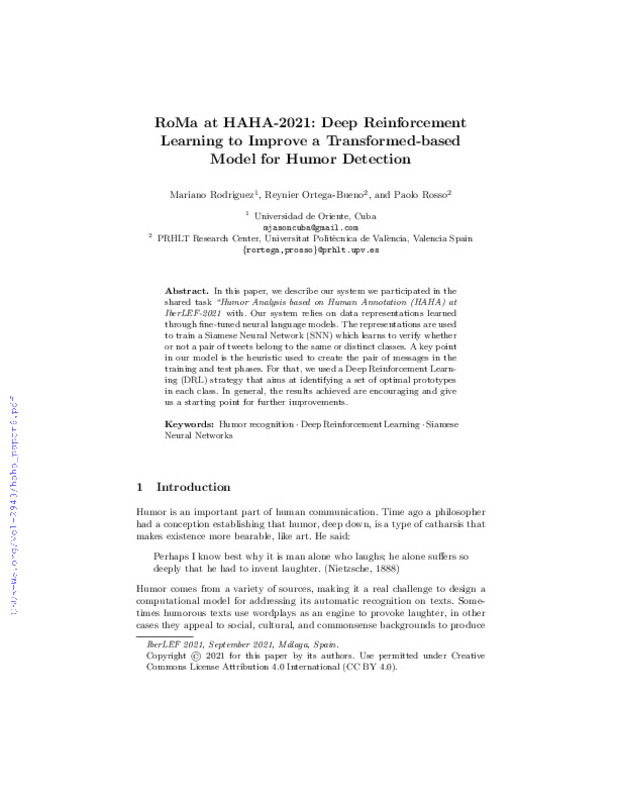JavaScript is disabled for your browser. Some features of this site may not work without it.
Buscar en RiuNet
Listar
Mi cuenta
Estadísticas
Ayuda RiuNet
Admin. UPV
RoMa at HAHA-2021: Deep Reinforcement Learning to Improve a Transformed-based Model for Humor Detection
Mostrar el registro sencillo del ítem
Ficheros en el ítem
| dc.contributor.author | Rodriguez, Mariano
|
es_ES |
| dc.contributor.author | Ortega-Bueno, Reynier
|
es_ES |
| dc.contributor.author | Rosso, Paolo
|
es_ES |
| dc.date.accessioned | 2022-12-12T08:08:38Z | |
| dc.date.available | 2022-12-12T08:08:38Z | |
| dc.date.issued | 2021-09-21 | es_ES |
| dc.identifier.issn | 1613-0073 | es_ES |
| dc.identifier.uri | http://hdl.handle.net/10251/190555 | |
| dc.description.abstract | [EN] In this paper, we describe our system we participated in the shared task ¿Humor Analysis based on Human Annotation (HAHA) at IberLEF-2021 with. Our system relies on data representations learned through fine-tuned neural language models. The representations are used to train a Siamese Neural Network (SNN) which learns to verify whether or not a pair of tweets belong to the same or distinct classes. A key point in our model is the heuristic used to create the pair of messages in the training and test phases. For that, we used a Deep Reinforcement Learning (DRL) strategy that aims at identifying a set of optimal prototypes in each class. In general, the results achieved are encouraging and give us a starting point for further improvements. | es_ES |
| dc.description.sponsorship | The work of the second and third authors was in the framework of the research project MISMIS-FAKEnHATE on MISinformation and MIScommunication in social media: FAKE news and HATE speech (PGC2018-096212-B-C31), funded by Spanish Ministry of Science and Innovation, and DeepPattern (PROMETEO/2019/121), funded by the Generalitat Valenciana. | es_ES |
| dc.language | Inglés | es_ES |
| dc.publisher | CEUR Workshop | es_ES |
| dc.relation.ispartof | Proceedings of the Working Notes of CLEF 2021, Conference and Labs of the Evaluation Forum, Bucharest, Romania, September 21st to 24th, 2021 | es_ES |
| dc.rights | Reconocimiento (by) | es_ES |
| dc.subject | Humor recognition | es_ES |
| dc.subject | Transformers, Deep reinforcement learning | es_ES |
| dc.subject | Siamese Neural Networks | es_ES |
| dc.subject.classification | LENGUAJES Y SISTEMAS INFORMATICOS | es_ES |
| dc.title | RoMa at HAHA-2021: Deep Reinforcement Learning to Improve a Transformed-based Model for Humor Detection | es_ES |
| dc.type | Comunicación en congreso | es_ES |
| dc.type | Artículo | es_ES |
| dc.relation.projectID | info:eu-repo/grantAgreement/AEI/Plan Estatal de Investigación Científica y Técnica y de Innovación 2017-2020/PGC2018-096212-B-C31/ES/DESINFORMACION Y AGRESIVIDAD EN SOCIAL MEDIA: AGREGANDO INFORMACION Y ANALIZANDO EL LENGUAJE/ | es_ES |
| dc.relation.projectID | info:eu-repo/grantAgreement/GVA//PROMETEO%2F2019%2F121//Deep learning for adaptative and multimodal interaction in pattern recognition/ | es_ES |
| dc.rights.accessRights | Abierto | es_ES |
| dc.contributor.affiliation | Universitat Politècnica de València. Escola Tècnica Superior d'Enginyeria Informàtica | es_ES |
| dc.description.bibliographicCitation | Rodriguez, M.; Ortega-Bueno, R.; Rosso, P. (2021). RoMa at HAHA-2021: Deep Reinforcement Learning to Improve a Transformed-based Model for Humor Detection. CEUR Workshop. 1-8. http://hdl.handle.net/10251/190555 | es_ES |
| dc.description.accrualMethod | S | es_ES |
| dc.relation.conferencename | Iberian Languages Evaluation Forum (IberLEF 2021) | es_ES |
| dc.relation.conferencedate | Septiembre 21-21,2021 | es_ES |
| dc.relation.conferenceplace | Online | es_ES |
| dc.relation.publisherversion | https://ceur-ws.org/Vol-2943/ | es_ES |
| dc.description.upvformatpinicio | 1 | es_ES |
| dc.description.upvformatpfin | 8 | es_ES |
| dc.type.version | info:eu-repo/semantics/publishedVersion | es_ES |
| dc.relation.pasarela | S\450784 | es_ES |
| dc.contributor.funder | Generalitat Valenciana | es_ES |






